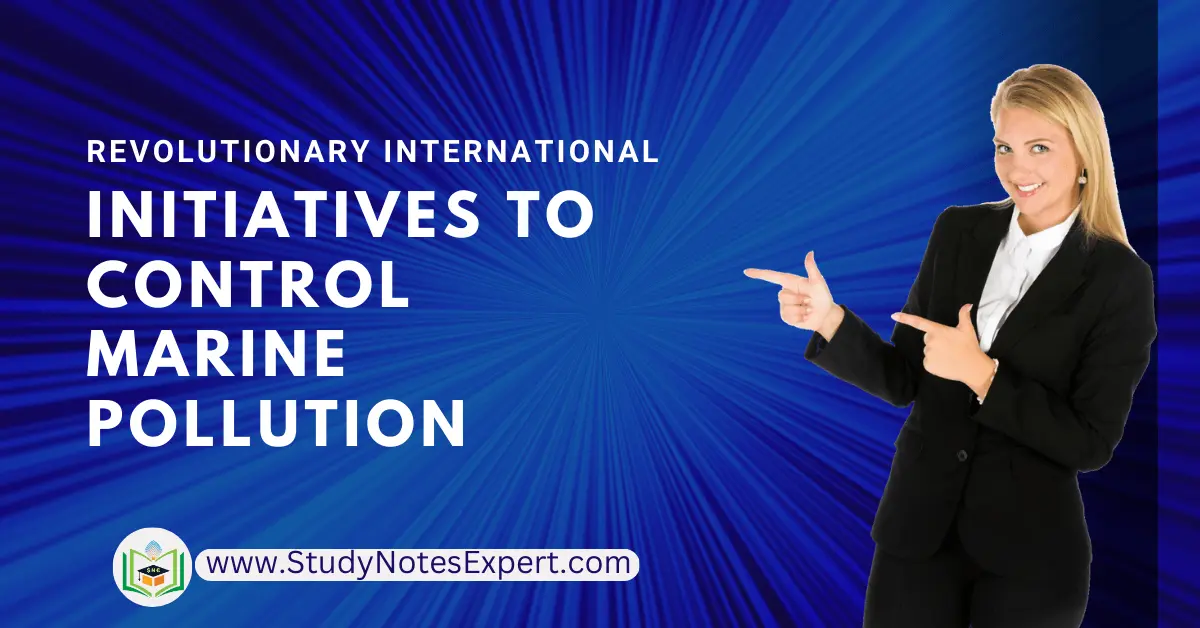Marine pollution refers to the presence of harmful substances or particles in the ocean and coastal waters, which can have detrimental effects on marine life and human health. The sources of marine pollution are varied and include human activities such as shipping, oil and gas exploration, and the disposal of waste. Marine pollution can also come from land-based activities, such as agriculture, urbanization, and industrial development. To prevent marine pollution, there are some international initiatives to control marine pollution.
Major International Initiatives to Control Marine Pollution
Several strategies exist to control Marine Pollution, such as:
- Laws and regulations enacted by governments may restrict the quantity of pollutants that can be released into the sea. The Convention for the Prevention of Pollution from Ships (MARPOL) and the Convention for the Prevention of Pollution from Ships (CPS) are two such examples (London Convention).
- Governments and non-profits can keep an eye out for pollution in the sea, and law enforcement can make sure rules are obeyed.
- The best way to combat marine pollution is through education and public awareness campaigns highlighting the issues and consequences of inaction.
- Organizations and volunteers may work together to clean up the water and eliminate all the trash and pollution that has washed ashore.
- The ocean’s health may be improved by research and development efforts by scientists and engineers into new technologies and methodologies to decrease pollution.
- International agreements and cooperation may regulate the release of pollutants and garbage into the sea, and sustainable practices can be encouraged in various nations to help reduce marine pollution.
Since 1972, several international agreements and programmes have focused on controlling marine and coastal pollution:
1972 London Dumping Convention and its 1996 Protocol
The purpose of the London Convention is to control all sources of marine pollution and prevent pollution of the sea through regulation of dumping waste materials into the sea. The 1996 Protocol, which is set to replace the convention, is more restrictive and adopts the ‘precautionary principle’. That is, it prohibits all dumping unless explicitly permitted. Further, it prohibits the incineration of wastes at sea and the export of wastes for dumping or incineration at sea.
1989 Basel Convention on the Control of Transboundary Movement of Hazardous Wastes and their Disposal
Until 1999, the convention has principally devoted the setting up a framework for controlling the movement of hazardous wastes across international frontiers. It has expanded its scope to include actively promoting and using cleaner technologies and production methods and preventing and monitoring illegal traffic.
Convention on the Prevention of Pollution from Ships (MARPOL)
It is the primary international convention covering the prevention of pollution of the marine environment by ships from operational or accidental causes.
1995 Global Programme of Action for the Protection of the Marine Environment from Land-based Activities (GPA-LBA)
This programme was adopted in Washington D.C., in the U.S., by over 100 countries, including the European Union (E.U.). The aim is to control contaminants like sewage, persistent organic pollutants, radioactive substances, heavy metals, oils, nutrients, sediments, and litter that enter the ocean from the land.
Regional Seas Programme of the United Nations Environment Programme (UNEP)
This programme has fostered regional cooperation on the marine and coastal environment. It has stimulated the creation of various Action Plans for sound environmental management in each region. India, Bangladesh, the Maldives, Pakistan and Sri Lanka are partners in the South Asian Seas Programme. India is a party to all the agreements mentioned above and programs.
Marine Litter and Microplastics Global Plan of Action (UN Environment)
This is a plan of action to combat marine litter and microplastics that aims to reduce marine litter and microplastics by identifying sources and pathways and taking action at the global, regional and national levels.
Overall, these initiatives aim to reduce marine pollution by setting standards for the discharge of pollutants and waste into the sea, and by promoting sustainable practices in industries that have the potential to impact the marine environment.

